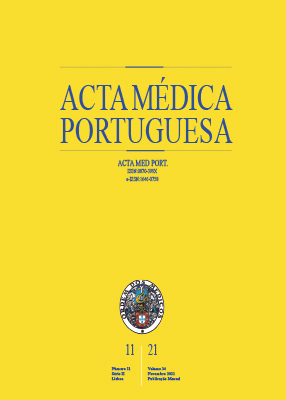Portuguese Authorship in Published Clinical Trials: Differences in Industry and Investigator Initiated Trials
DOI:
https://doi.org/10.20344/amp.14554Keywords:
Authorship, Clinical Trials as Topic, Portugal, PublishingAbstract
Introduction: The aim of this study was to investigate the Portuguese authorship in publications resulting from trials initiated by the industry or investigators and run in Portugal.
Material and Methods: Clinical trials with Portuguese institutions as sponsor or recruiting centers, and registered in four clinical trial registries, in the last 14 years, were assessed. Publications of completed trials, from both the initiative of the industry and investigatorswere screened and compared.
Results: The percentage of published trials initiated by industry and investigators was similar (28.0%). However, the percentage of completed investigator-initiated trials (43.6%) was lower when compared to industry trials (69.7%). There was a higher percentage of Portuguese authorship in published investigator-initiated trials when compared with industry-initiated trials (47.1% vs 8.5%, respectively). Moreover, industry-initiated trials with Portuguese authors were published in journals with lower journal impact factor when compared with those published without authorship of Portuguese investigators. Oncology was the therapeutic area with the highest number of clinical trial registrations and publications. However, in publications with Portuguese authors, industry Initiated trials mainly focused on neurology while investigator-initiated trials had a higher number of papers in the fields of gastroenterology and infection diseases. Published trials with Portuguese authorship, initiated by the industry or investigators, also targeted different populations and had different purposes. In both cases, no significant differences were observed in terms of the journal impact factor or in the alignment of the published randomized trials with the respective reporting guidelines.
Discussion: When compared with previous publications, this study showed an increasing trend in the number of clinical trials in Portugal, published within similar timeframes, after trial conclusion. Even though both industry and investigator trials are published within the standards for reporting trials, the low number of Portuguese authorships in industry publications might underline the need for invigorating these independent clinical trials in Portugal by capacitating and empowering national clinical research teams.
Conclusion: This study confirmed that even though all registered trials had the involvement of Portuguese institutions as a recruiting center, not all the published trials had Portuguese investigators as authors, mainly those initiated by the industry.
Downloads
Downloads
Published
How to Cite
Issue
Section
License
Copyright (c) 2021 Acta Médica Portuguesa

This work is licensed under a Creative Commons Attribution-NonCommercial 4.0 International License.
All the articles published in the AMP are open access and comply with the requirements of funding agencies or academic institutions. The AMP is governed by the terms of the Creative Commons ‘Attribution – Non-Commercial Use - (CC-BY-NC)’ license, regarding the use by third parties.
It is the author’s responsibility to obtain approval for the reproduction of figures, tables, etc. from other publications.
Upon acceptance of an article for publication, the authors will be asked to complete the ICMJE “Copyright Liability and Copyright Sharing Statement “(http://www.actamedicaportuguesa.com/info/AMP-NormasPublicacao.pdf) and the “Declaration of Potential Conflicts of Interest” (http:// www.icmje.org/conflicts-of-interest). An e-mail will be sent to the corresponding author to acknowledge receipt of the manuscript.
After publication, the authors are authorised to make their articles available in repositories of their institutions of origin, as long as they always mention where they were published and according to the Creative Commons license.









